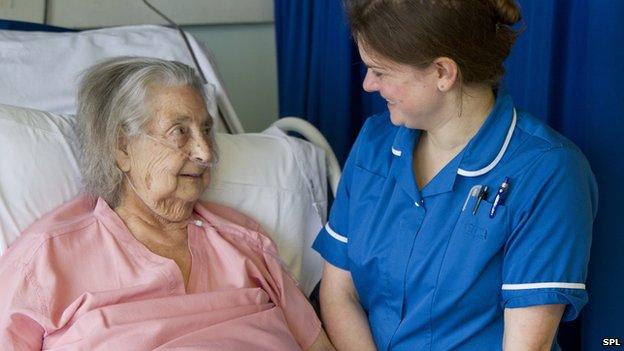Hospital discharges: figures highlight impact of delays
- Published

NHS figures have highlighted the growing impact of delays in discharging patients in England once they are fit to leave hospital.
Last month the number of days "lost" by patients who needed the beds was the highest for more than three years.
Senior doctors working in accident and emergency departments say it is a major cause for concern.
NHS England said it was aware of the problem, but care working groups across the country were tackling it.
The problem facing the health service is about making sure patients who are fit to leave hospital can recover in the right place, and their beds are made available to others who need them.
Figures from NHS England show the number of hospital bed days lost because of delayed discharges in October was 78,424.
That is up nearly 8,000 on the same time last year, and the highest since monthly data was first published in August 2010.
Growing problem
The figures also indicate that getting appropriate social care in place - so patients can be discharged safely with the right support at home or in a care home - is a growing problem.
The number of hospital bed days lost where the delay was caused by social care difficulties was 14,830 in October. This is the highest since April 2011.
The President of the College of Emergency Medicine, Dr Clifford Mann, said the figures were not a surprise, but were a cause for concern.
"The delays are a key cause of overcrowding in emergency departments, which is associated with higher mortality," he said.
However, he added that the announcement this week of extra funding to relieve pressure on A and E departments was "very welcome"
"Intense pressure"
For Labour, shadow health secretary Andy Burnham said the figures exposed the intense pressure faced by hospitals in England.
"David Cameron's severe cuts to older people's home care services have left people without adequate support and at risk of hospitalisation. Once admitted, a growing number are trapped on wards because they can't be discharged."
A spokesman for the Local Government Association said councils had worked hard to protect social care services from the full impact of cuts, but added: "Unless local government finance is put on a sustainable footing, social care will remain substantially underfunded and services will suffer as a result."
In a statement, NHS England said it was very aware of the pressures hospitals faced when they could not discharge patients.
"Across the country we have urgent care working groups set up so the whole health and social care system is pulling together to tackle these important issues. The extra £150 million that we have just released will help. We need to get every penny we can working hard for patients."
A spokesperson for the Department of Health in England said in an average week NHS hospitals in England admitted a quarter of a million patients, and in that context the number of delays was very low.
"But no patients should experience unnecessary delays. We know hospitals need to join up better with social care and community services and are investing £3.8 billion in making this happen."
- Published8 November 2011
- Published29 October 2013
- Published13 September 2013